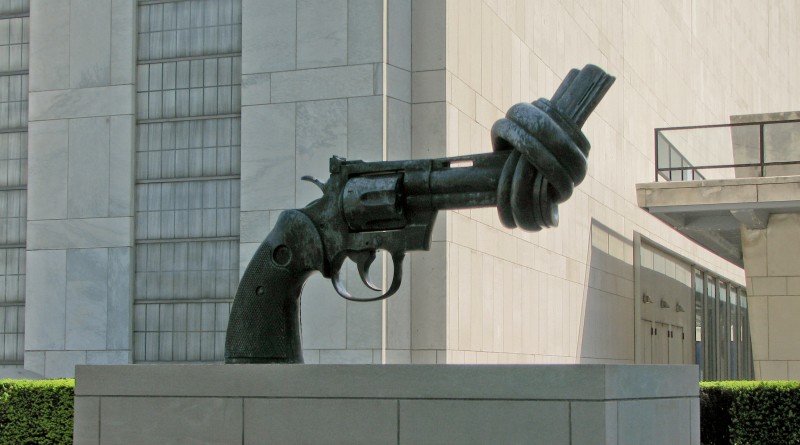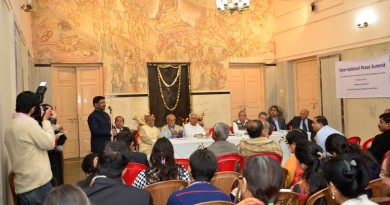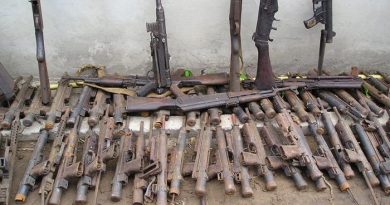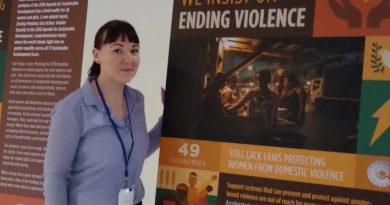CGNK Pushes for Nonkilling Sustainable Development Goals at UN
A written statement addressing the 2016 High-Level Segment of the United Nations Economic and Social Council, focused on “Implementing the post-2015 development agenda: moving from commitments to results” was accepted for discussion at this important forum that is to be held in July 2016 at the United Nations Headquarters in New York. This international forum is meant to advance coordination, dialogue and follow-up and review on the 2030 Agenda for Sustainable Development, in line with the relevant mandates of the United Nations.
This Statement is the result of the international conference on the topic “Peaceful, Killing-free Societies as a Sustainable Development Goal” convened, in March 2016, by the Center for Global Nonkilling and Åbo Akademi University .The English, French, and Spanish versions of the statement can be downloaded here or from the official UN documentation site under reference number E/2016/NGO/13.
Peaceful, Killing-free Societies as a Sustainable Development Goal
The Center for Global Nonkilling and Åbo Akademi University convened, in March 2016, an international conference on the topic “Peaceful, Killing-free Societies as a Sustainable Development Goal” seeking to contribute to the debate around the 2030 Agenda. The conveners celebrated the inclusion of building killing-free societies as an integral part of the SDGs in target 16.1 and in other targets that address violence directly or through the interconnected risk factors that perpetuate its deadly societal circle (3.4, 3.5, 4.2, 4.7, 4a, 5.2, 5.3, 11.7, 16.2, 16.3).
The inclusion of prevention and reduction of killing as a measurable component of SDGs provides unique social, political and institutional momentum to put violence prevention policies, programs and strategies into effective practise. The following recommendations are submitted as a contribution toward implementation:
- Measurability: Making progress toward killing-free societies requires taking all deaths equally seriously. We strongly recommend that the Economic and Social Council (ECOSOC) and the General Assembly adopt the indicators proposed by the Inter-agency and Expert Group on SDG Indicators, including the measurement of conflict-related deaths.
- Accountability: The lack of legally binding commitments represents a significant drawback of the SDGs framework. We strongly recommend that mechanisms for accountability are put into place allowing civil society to engage through independent progress reports, reviews and recommendations.
- Interdependence: Negative and mutually reinforcing links exist between violence and development. Failure to address lethality and other forms of violence together with its risk factors can jeopardize other development goals. The “Vasa Statement on Education for Killing-Free Societies” is an example of cross-SDG integration of violence prevention.
- Understand the Burden of Killing: Violence takes a huge toll on human life and well-being, but also in economic terms. The frequent argument of austerity that prevents adequate investment in violence prevention must be placed against the backdrop of massive spending on failed coercive “solutions” to violence. Serious consideration must be given to a systematic shift of resources toward prevention efforts at all stages.
- Enhance the Right to Life: Article 6 of the International Covenant on Civil and Political Rights proclaims that “Every human being has the inherent right to life”. A shift is required from the politics of taking life to the politics of affirming it, ensuring existing laws relevant to violence prevention are fully enforced and that departments, infrastructures and constitutional provisions for peace, disarmament and nonkilling are put into place.
- Learn from Sustainable and Peaceful Communities: More research and first-hand experiential knowledge of communities that are engaging in sustainable and nonviolent ways of living is needed. The current planetary ecological crisis is also a crisis of imagination, and positive role models are needed to foster creative thinking regarding what is possible and show practical ways to transform unsustainable/violent societies into sustainable and peaceful ones.




